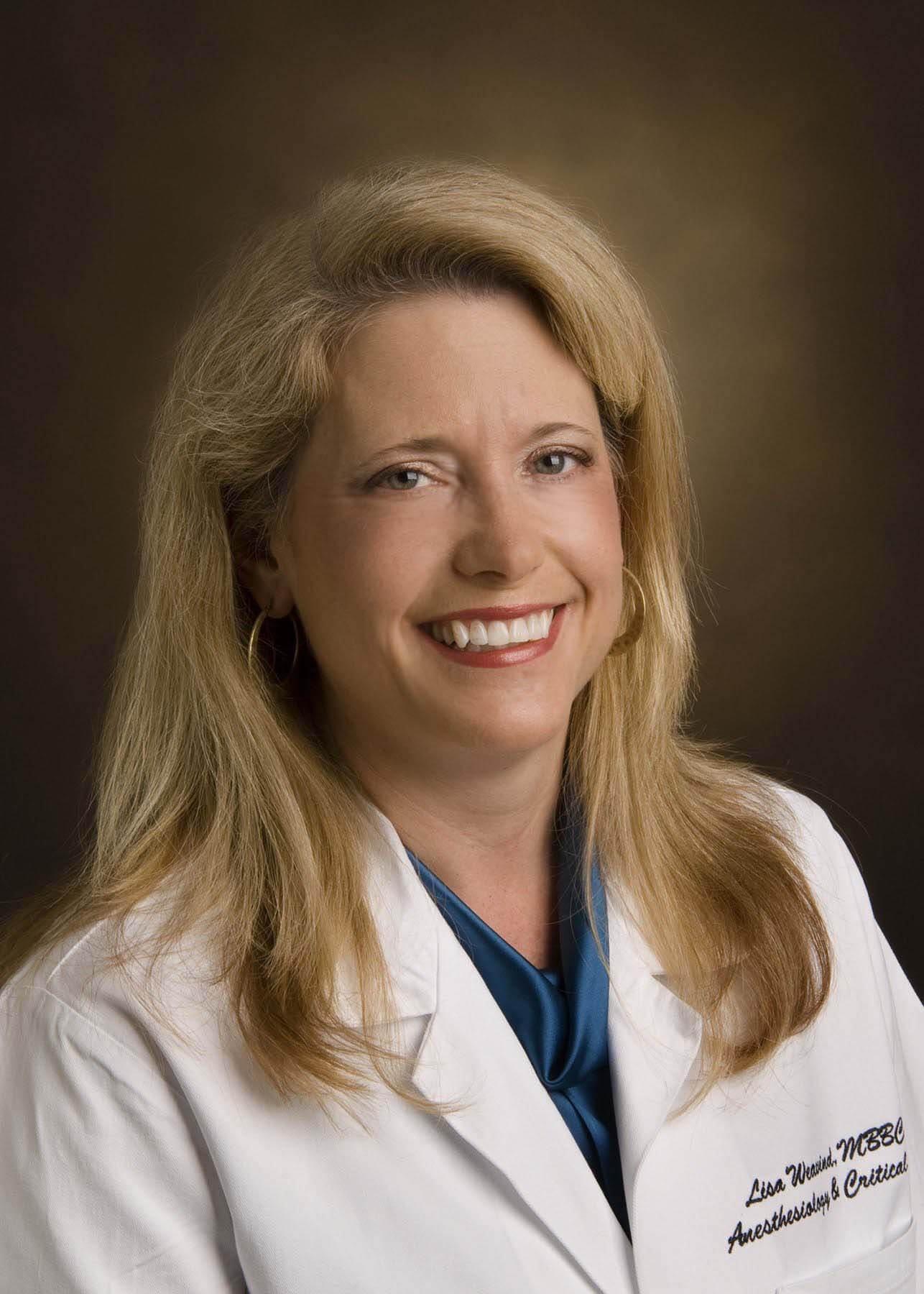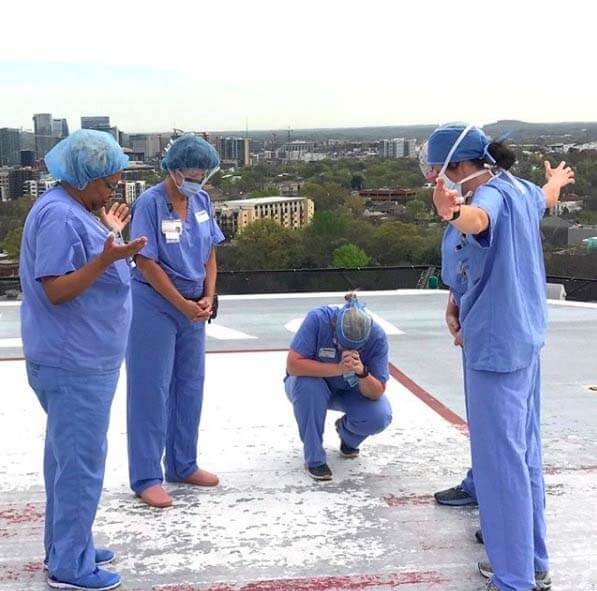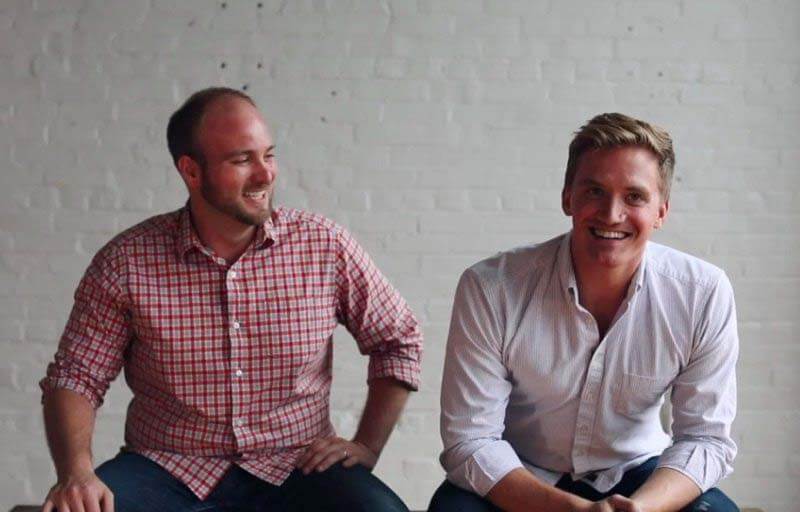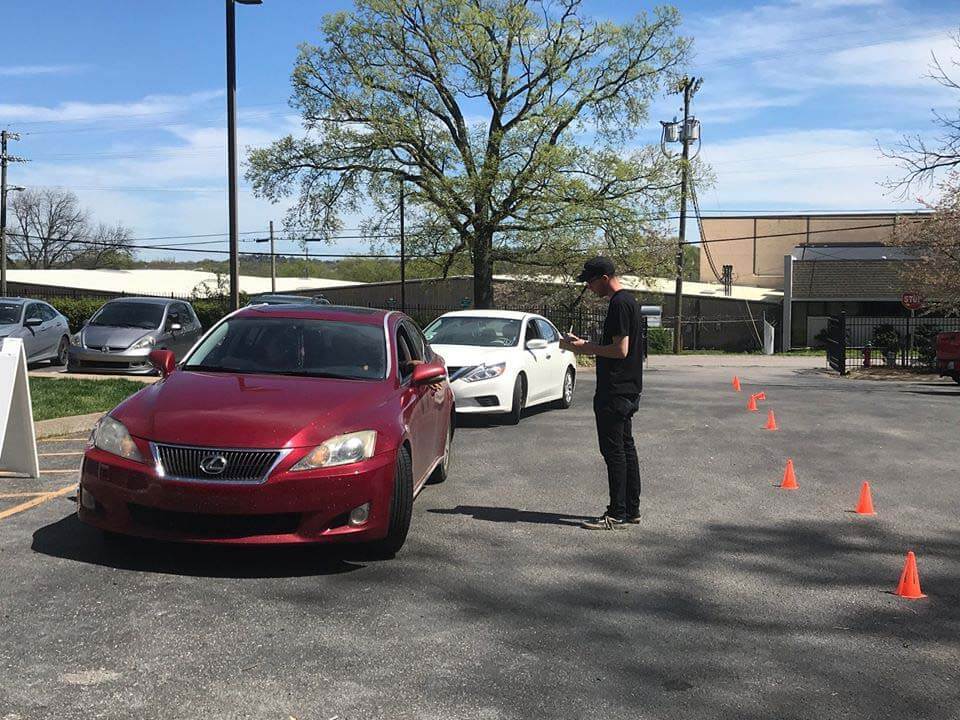Each week in our new series, Heroes on the Frontlines, we are introducing you to people from all over the South who are stepping up and fulfilling their job duties in extraordinary — and sometimes completely different — ways, all for the betterment of mankind. From healthcare workers to homeless advocates, so many of these heroes are putting aside their self-concerns to care for others. Get to know these people better in this very special new series.
**********
Dr. Liza Weavind is a Professor of Anesthesiology and Surgery, Associate Division Chief of Anesthesiology Critical Care Medicine, Associate Chief of Staff and Director of TeleICU at Vanderbilt University Medical Center in Nashville, TN. She’s been practicing and teaching medicine for more than 20 years, and right now, she’s preparing for the surge of coronavirus cases that is still to come. Find out from this frontline hero how she and the team of physicians at VUMC are preparing for — and caring for — patients affected by COVID-19.

Describe what a typical shift in the ICU is like right now.
At this time VUMC has six specialty adult ICUs and a specific COVID-19 ICU and stepdown floor for COVID-19 patients. The COVID-19 surge has not hit Nashville yet and VUMC, as well as our surrounding hospitals, have a moderate number of COVID-19 patients admitted to the hospital and some who are critically ill and admitted to the medical ICU under the care of our pulmonary ICU physicians.
We are prepared for and ready to accept a vast influx of very sick COVID-19 patients when Nashville and the surrounding areas experience the coronavirus surge, but at this time we are all working normally within our capacity. All the intensivists (pulmonary, anesthesia and surgery doctors who work in the ICUs with critically ill patients) are working collaboratively to expand the scope and capacity of the Vanderbilt Medical Center Hospital to deal with as many of the patients who need ICU care, as this virus spreads through our community.
We are relying on the fact that we have put the right preparation, process and training in place to ensure that we will have the people, the personal protective equipment and the ventilators ready at our disposal to avoid the carnage that is the New York coronavirus experience.
We are also working collaboratively with our surrounding hospitals to make sure we balance the load of patients when the influx happens.
How is a typical work shift different for you now vs. pre-COVID-19?
At the moment, it is the anticipatory anxiety of waiting for the expected onslaught of critically ill patients. We are very Type A physicians, and we are ready to deal with any situation in the moment — the waiting is the hardest part. I spend a lot of my time walking around the various ICUs listening to the anxious questions and answering them with data and providing the ICU teams with situational awareness. I find that leading by walking around and being seen does a tremendous amount to calm shattered nerves and provide active listening and factual feedback to help our nurses, faculty and trainees stay focused on their safety and the safety of their patients.
The next few weeks may be a whole different story, and I will probably have a whole lot more to tell you on the other side of this tsunami.

RELATED: 5 Good Things That Happened This Week
What has been the most memorable/impactful/life-changing experience you have had during the pandemic so far — either with a patient, a family, volunteer outreach, etc.?
What I miss the most is having our families at the bedside of our critically ill patients. I understand the safety aspects of having the general public out of the hospital at this time to protect the public health and also to protect the patients and healthcare teams, but I also understand how anxiety-provoking and helpless our families feel when they can’t join our ICU team on rounds and participate in the discussion about the care for their sick loved one.
The most amazing thing we have done is use iPads to FaceTime with families when we round and also have our awake patients FaceTime with their families. It is an amazing use of telemedicine to improve contact and communication from inside the hospital to home.
What is the most important thing you want the general population to know about the work that healthcare professionals are doing right now?
Healthcare professionals are some of the most amazing, selfless human beings on earth (as with most others in the service industry — firefighters, police, teachers, cleaning staff, etc.), and they are scared of infecting themselves and their families when they are walking into the hospital to look after any hurt, sick, injured patient with or without COVID-19. Please be aware that your (the general public) flouting the social isolation rules, thinking we are overreacting and behaving like self-involved idiots puts every one of these selfless providers and their families at risk — so PLEASE STAY AT HOME.
What is the one thing you look most forward to when we’re past COVID-19?
Champagne and sleep.
Is there anything the general population can do to better support the people on the frontline?
Stay at home, wash your hands, and stay healthy.
Is there anything else you’d like to add?
Thank you for giving me the chance to highlight the work we do and to say that no matter what hits Nashville — flood, tornado or coronavirus — we are #NASHVILLESTRONG, and nothing will break our ability to come through this together.
**********
When Louisville-based leather company Clayton & Crume had to close its doors due to coronavirus, owners Clay Simpson and Tyler Jury had to also send their staff of 25 people home to enforce social distancing guidelines. The pair returned to the shop last week and were struck by the silence and lack of typical activity. In an effort to make a difference during the pandemic, they decided to shift directions and utilize their knowledge of design, manufacturing and assembly in a new way … making masks for physicians on the frontlines. Their initial goal was to make 1,000 masks by the end of the week that they would deliver to Louisville hospitals and immediate care centers. Within 24 hours, they received a call from Kentucky Gov. Andy Beshear’s office. He learned of their designs and placed an order for a half million of the plastic face shields. Now in a much larger, 20,000-square-foot space, the owners and their team are hard at work to fulfill that order. Learn more about how these heroes are shifting their focus from leather goods to lifesaving equipment.

Describe how you decided to shift from making quality leather goods to creating half a million PPE items.
We wanted to figure out a way to make a difference, even if a small one, while our workshop and retail store were shut down. As our awareness of our medical community’s needs grew, and our resources at our shop continued to nudge us to respond, we turned to what we know how to do best: create.
Are the masks being made by hand, or is it an automated production process?
The material is brought in from suppliers around the region, and then we’re assembling by hand.
What has been the most memorable, impactful or life-
It’s been touching to see the messages from the frontline medical workers. They share their heartfelt stories, and that is motivation for us to come in every day and tackle this project head-on.
RELATED: The Power of Family During This Pandemic
Is there anything the general population can do to better support the people on the frontline such as yourself?
Our leather goods are still available online, so that’s the best way to support our efforts.


What is the one thing you look most forward to when we’re past COVID-19 — either with work or in your personal life?
High-fiving our team! Our team has been instrumental in this process, and without everyone at C&C, we wouldn’t have been able to pull off this large-scale project.
What is the most important thing you want the general population to know about the work that your business is doing right now?
Clayton & Crume began with a mission to make leather goods that last. While we anxiously await for life to return to “normal,” we are responding to the challenge that lies ahead with that same spirit and intention — to create, by hand, what is tested and lasting. We plan to share this journey and encourage you to follow along as we tackle something beyond what we ever imagined we would create.
*********
Laura Chavarria is the executive director of Nashville Humane Association (NHA). Though she and her team are all working remotely — and with a skeleton crew, no less — they are still doing tremendous work. In addition to finding homes for the animals, they’re also hustling to supply resources to pet owners who may have lost their job and therefore, may struggle with affording pet care. Find out more about the various ways in which this pandemic is affecting animal shelters like NHA, and marvel at the tireless work Laura and her team are doing.

Describe what a typical shift at your job is like right now. How is it different for you now vs. pre-COVID-19?
To reduce exposure, while still serving our two-legged and four-legged community, we are running operations on a skeleton crew. Right now, I work from home, and some days I am the manager on duty that is physically at the shelter. Our skeleton crew is comprised of animal care technicians, veterinary service technicians, and a manager. This crew takes care of the animals who are still physically in the building. The majority of our animals are in foster care, but there are critters who are behaviorally or medically unfit for a foster home. We also have some folks working from home on social media, continued education, and other programs. I am trying to maximize my staff’s impact and productivity during such an unsure time. So much information is coming out daily, and we are doing our best to try to keep up. I have had to research the Paycheck Protection Program, EIB loans, and other financial opportunities that could help us continue operations. I have been watching webinars and reading articles on this pandemic and the impact it is having and could have on our nonprofit. We also have expanded and shifted our programming to address the community’s current needs. We are providing more resources (food, crates, enrichment, medication) to owners who are losing their jobs. We want to try to support the human-animal bond and give resources to those in need to keep their beloved pet in their home. We have had to shift our very personal customer service adoption process to drive-thru-style foster-based adoptions.
What has been the most memorable, impactful or life-
Nashville had a horrific tornado devastate the community the first week of March. COVID-19 hit soon after while our community was already struggling. I will forever remember the way our community has responded to both struggles beautifully. We put out a foster plea for folks to foster animals during the quarantine. We had 114 animals in need of foster and received over 1,000 foster applications! Our community is an animal-loving community, and it shows in their response.
We also had to put a halt on accepting donations because we were receiving too many. We did not have enough storage or staff to be able to keep up. Isn’t that a beautiful thing? Our neighbors love and support one another. I know that we can get through anything as long as we are doing it together.

RELATED: Ten 30-Day Challenge Ideas to Try This Month
Is there anything the general population can do to better support the people on the frontline such as yourself?
STAY HOME! We are seeing the impact COVID-19 is having on pet owners — job loss, etc. Folks have so many things to worry about right now, and we don’t want their animals or their ability to provide appropriate care to be one of them. The sooner we all stay home and feel better, the sooner our pet owners can get back to work.
What is the most important thing you want the general population to know about the work that Humane employees and volunteers are doing right now?
Our jobs have actually gotten busier since quarantine started. We are providing support in the forms of food bank programs, adoption programs, foster programs, and animal resource directory programs. We have shifted a lot of our in-person customer service to virtual counseling adopters and the community. We are working diligently to transport animals out of at-risk situations and into our life-saving program. Our jobs are physically and emotionally taxing, but we know the extreme value animals add to our lives, especially in stressful times.

What is the one thing you look most forward to when we’re past COVID-19 — either with work or in your personal life?
I look forward to having the ability to work with my entire team again. Since early March we have all worked in different shifts to limit exposure. Nashville Humane is one big family, and not being able to gather and support each other physically has been very difficult.
Is there anything else you’d like to add?
I love how animals are still magical and bring our communities together even in times of social distancing. Zoom meetings are being adorably interrupted by dogs, cats are commandeering keyboards, and walking our dogs is the closest thing we have to normal right now.
To meet the animals currently available for foster or adoption, click HERE.
*********
Financial stability often feels elusive, but it doesn’t have to. Get answers to 10 tough money questions to help you get your financial house in order. Click HERE.




















